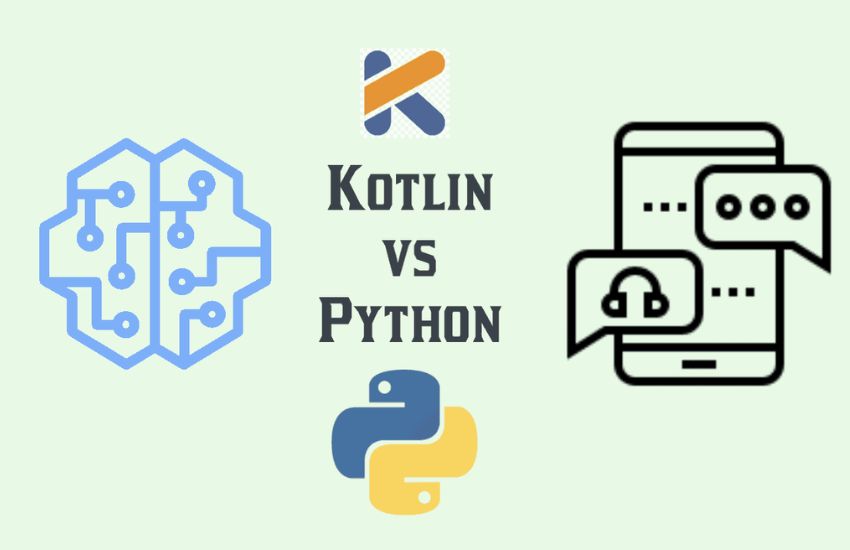Both languages, Kotlin and Python, have a stronghold in the development ecosystem. Python keeps on holding its forte in data science, machine learning, and scripting environments for its relative ease, huge ecosystem, and well-developed libraries.
Kotlin is now the de facto language for modern Android development, being supported by JetBrains and Google, and benefits such as static typing, null safety, and concise syntax. While considering Python vs. Kotlin for Android, it is proper to say that Kotlin is favored by its easy-going integration with the JVM and official tooling support.
Yet for beginners exploring general programming, Python or Kotlin for beginners leans heavily toward Python due to its gentle learning curve. Ultimately, the decision hinges on your project goals: back-end and AI projects are best served by Python, whereas native mobile apps and multiplatform modules often favor Kotlin.
1. Ecosystem Maturity and Popularity
Python’s longevity has fostered a rich ecosystem, spanning web frameworks (Django, Flask), data-science libraries (NumPy, pandas, TensorFlow), and scripting tools that few can rival.
By contrast, Kotlin’s community remains smaller but highly focused, with rapid growth driven by Android and multiplatform initiatives.
According to a recent GeeksforGeeks roundup, Python ranks among the top three languages for 2025, while Kotlin sits at a commendable seventh position. If your priority is community support and third-party packages, Python still leads Kotlin vs. Python head-to-head.
2. Performance and Compilation
Kotlin compiles to JVM bytecode (or native binaries via Kotlin/Native), offering performance that often outpaces interpreted languages. Benchmarks show Kotlin applications executing anywhere from 2× to 10× faster than equivalent Python scripts in CPU-intensive tasks.
Python’s runtime speed has improved (via PyPy JIT and C-accelerated modules), but it can still lag behind Kotlin vs. Python in scenarios demanding tight loops or low latency. Therefore, for compute-heavy back-end services or real-time systems, Kotlin may offer measurable gains.
3. Android-Centric Development
When considering Python vs. Kotlin for Android, Kotlin exclusively holds Google’s endorsement as a first-class Android language. It’s null safety, extension functions, and coroutines that simplify common mobile-development pitfalls like NPEs and thread management.
While Python frameworks (e.g., Kivy or BeeWare) exist, they lack the polish and deep OS integration that Kotlin enjoys. In plain terms, if you’re building production-grade Android apps, Kotlin is the superior choice.
4. Learning Curve and Developer Productivity
For newcomers, Python or Kotlin for beginners often resolves to Python. It’s clean, indentation-driven syntax and immediate REPL feedback make it exceptionally beginner-friendly. Kotlin’s static type system demands explicit declarations, which steepens the initial learning curve, though it catches type errors early and can lead to more maintainable code in large projects.
If your goal is rapid prototyping or entering data science roles, Python’s straightforward path wins; if you’re targeting mobile or enterprise back-ends, investing in Kotlin may pay dividends.
5. Key Kotlin and Python Differences
- Typing Discipline: Kotlin is statically typed, enabling compile-time checks. Python is dynamically typed, prioritizing flexibility over upfront safety.
- Concurrency Models: Kotlin’s coroutines provide lightweight, structured concurrency. Python relies on threading, multiprocessing, and asyncio, each with trade-offs in complexity and performance.
- Platform Targets: Python runs natively on nearly every platform, from servers to Raspberry Pi; Kotlin shines on JVM, Android, and emerging multi-platform targets (iOS, web via Kotlin/JS).
- Tooling & IDE Support: Kotlin benefits from first-class IntelliJ IDEA integration; Python offers broad support across VS Code, PyCharm, and countless editors.
6. Use-Case Recommendations
- Data Science & AI: Python’s libraries (scikit-learn, PyTorch) make it indispensable for machine learning workflows.
- Web Back-Ends & Scripting: Python frameworks provide rapid development cycles; Kotlin’s Ktor is growing but still nascent.
- Mobile Apps: Kotlin is purpose-built for Android; Python options exist but rarely match Kotlin’s robustness.
- Cross-Platform Modules: Kotlin Multi Platform offers shared logic across iOS, Android, desktop, and web; no Python equivalent can match that integration.
7. Community Support & Industry Adoption
The vitality of a language often hinges on its community momentum and corporate backing. Python commands a staggering 100 million developers on GitHub, with usage climbing at a 22.5 percent annual rate, underscoring its pervasive industry footprint.
Roughly 90 percent of Fortune 100 companies maintain Python repositories, reflecting deep organizational trust. Kotlin’s ecosystem, though more focused, is rapidly expanding: Multibillion-dollar firms like Netflix, Baidu, and Kuaishou rely on Kotlin Multiplatform for shared codebases, demonstrating its enterprise credibility.
Backed by JetBrains’ active 2025 roadmap, Kotlin’s tooling and library enhancements continue to accelerate adoption. Industry reports even highlight a 20–35 percent productivity boost when teams migrate to Kotlin, showcasing its growing real-world impact.
Conclusion
When it comes to the debate on Python vs. Kotlin, the classic answer of one size fits all is nonexistent. Python simply remains a significant leader in general-purpose programming, data analysis, and fast prototyping. For Android projects or statically checked, high-performance JVM code, Kotlin may be the new-age winner.
However, your choice may have to conform to project specifications, team skills, and future maintainability objectives. Understand these differences, and you are prepared to select the right tool for your next adventure in development for 2025.
